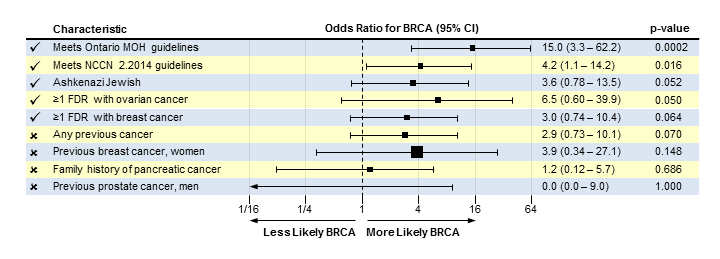Some pancreatic cancer patients (hereinafter referring just to those with ductal adenocarcinoma of the pancreas) have substantially better outcomes than the majority. In the paper now reviewed by this blog entry (link at the end of this article) as published in the October 2016 issue of Endocrine-related Cancer journal, the French authors summarize surveillance, prognosis and treatment options for pancreatic cancer patients that are ONLY ASSOCIATED with BRCA2 genetic mutations. They also identify characteristics of other patients with pancreatic cancer who may benefit from the same or similar treatment regimens. What we can learn from pancreatic cancer BRCA2 treatment successes may be able to be applied to other pancreatic cancer patients, even possibly providing for further rates of improved outcomes.
The encouraging results for these pancreatic cancer patients were paved by earlier breast and ovarian cancer studies noting improved survival of patients carrying BRCA1 and BRCA2 mutations treated with platinum-based chemotherapy (here and here) and PARP inhibitor therapy (here). Individual case reports for those with pancreatic cancer (here and here) showed similar connections between platinum chemotherapy and more positive treatment outcomes. Around the same time, treatment selection evaluated a tumor’s genetic mutations in addition to the site of origin. More rigorous studies followed, strengthening the connection and uncovering additional mutation types that might benefit from these types of therapy for pancreatic cancer.
The Beginnings of an Era of More Effective BRCA2 Pancreatic Cancer Treatment
Recent genome-wide studies of pancreatic tumors identified four distinct mutational subtypes of pancreatic cancer. Most BRCA2 pancreatic cancer patients appear to fall into the ‘unstable’ subtype comprising 14% of all pancreatic tumors in the study. ‘Unstable’ tumors have large number of chromosomal rearrangements, pointing to a broken DNA homologous recombination (HR) repair mechanism. The authors note that mutations in other Fanconi pathway genes such as BRCA1, FANC-C, FANC-G, ATM, and PALB2 may also be sensitive to platinum chemotherapies and PARP inhibitors (in vivo study on FANCC/FANCG, in vitro study on PALB2). Reliably effective treatments for pancreatic cancer are generally elusive, but these treatments in patients with pancreatic cancer who carry certain genetic mutations may offer increasing promise.
Eventually, secondary mutations in heavily treated BRCA2 pancreatic cancer may cause resistance to platinum chemotherapy (here). Depending upon how the secondary mutations restored BRCA function, PARP inhibitors may still be effective (here).
Germline (inherited) BRCA2 mutations account for around 5% of all pancreatic cancer (here). Germline mutations in BRCA1, PALB2, ATM, FANC-C and FANC-G are less prevalent. Mutations in these same genes also account for 10-15% of all sporadic (non-inherited) pancreatic cancer (here and here). Patients in both of these groups may be in a position to benefit from platinum and PARP inhibitor treatments.
Familial Pancreatic Cancer
The authors in the study at hand discuss familial pancreatic cancer in much detail, recommending screening for high-risk individuals. Familial pancreatic cancer families consist of BRCA2 carriers with ≥1 first-degree relative with pancreatic cancer, or anyone with ≥2 blood relatives with pancreatic cancer. The authors postulate that Endoscopic Ultrasound (EUS) and MRI are the most effective screening methods (here), but both can offer a potential high risk of overtreatment when benign cystic lesions are mistaken for malignant tumors (here). Prophylactic surgery in individuals at high risk for familial pancreatic cancer was not recommended due to high mortality and medical complication rates.
In familial pancreatic cancer, BRCA2 appears to be a major player. But in 80-85% of familial pancreatic cancer, no germline mutation has yet been identified. Registries exist to document and help identify the causes of familial pancreatic cancer. Participation in these registries does not necessarily provide for early detection, but may lead to improved population-wide understanding of the genetic and environmental aspects of pancreatic cancer.
Summary
More effective treatments (platinum chemotherapy and PARP inhibitors) exist for pancreatic cancer patients with BRCA2 mutations. These treatments may also benefit those with BRCA1, PALB2, ATM, FANC-C or FANC-G mutations. Half of all pancreatic cancer patients with BRCA2 mutations do not meet genetic testing criteria (here), implying that more could be benefitting from these treatments but are unaware of their status. Thus, it is important to draw the attention of patients and professionals to this important and even critical information.

David Dessert
